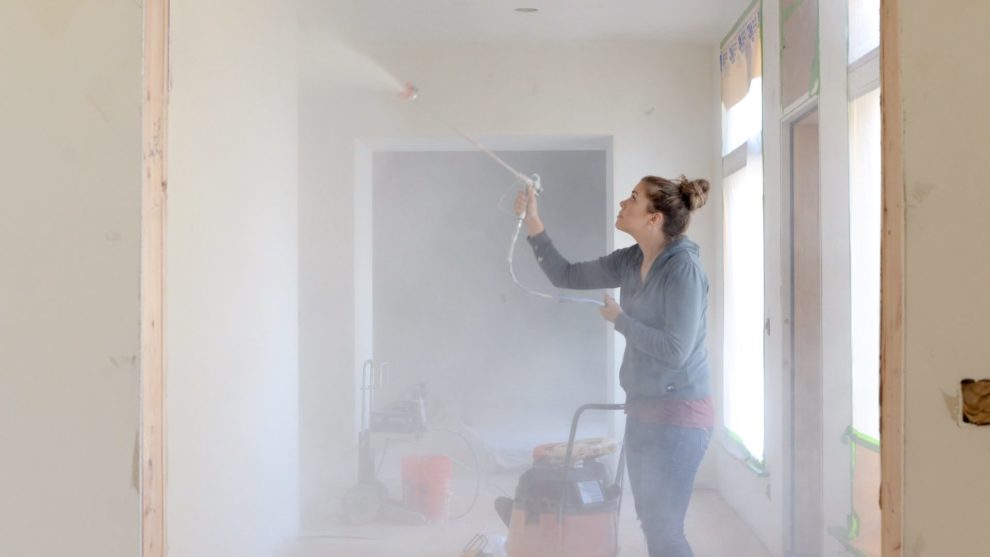Drywall is a popular construction material used in construction and renovation projects. However, cutting, sanding, or demolishing drywall creates a significant amount of dust. Inhaling this dust can lead to health problems, especially if there is frequent or prolonged exposure.
If you’re a homeowner or contractor who regularly deals with drywall, you might be surprised how long drywall dust can stay in your lungs. In this blog post, we explore the health risks of drywall dust exposure and provide tips on how to protect yourself.
Table of Contents
How does drywall dust affect your health?
Inhaling drywall dust can lead to a variety of health problems, including:
- Respiratory problems: Drywall dust can irritate your airways and cause coughing, wheezing, and shortness of breath. If you have asthma or another respiratory condition, exposure to drywall dust can make your symptoms worse.
- Allergic reactions: Some people may develop an allergic reaction to drywall dust. Symptoms include itchy eyes, runny nose, and skin rashes.
- Silicosis: Plasterboard dust contains a mineral called silica, which can cause lung damage when inhaled in large quantities. Prolonged exposure to silica dust can lead to a condition called silicosis, which can cause permanent lung damage and even death in severe cases.
How long does drywall dust stay in your lungs?
The length of time drywall dust stays in your lungs depends on a variety of factors, including the frequency and frequency of exposure, the person’s overall health, and any protective measures taken.
In general, the body’s natural defense mechanisms, such as coughing and sneezing, help clear some of the dust from your lungs. However, some small particles may remain trapped in your lungs for long periods, especially if exposure is frequent or prolonged.
In most cases, the body can eliminate most of the dirt within a few days or weeks. However, some people may experience severe symptoms for months or years after exposure.
How to Protect Yourself from Drywall Dust
If you’re working with drywall, there are several steps you can take to protect yourself from dust exposure, including:
- Wear protective gear: Always wear a dust mask, goggles, and gloves when cutting, sanding, or demolishing drywall.
- Use proper ventilation: Make sure the work area is well-ventilated to prevent dust accumulation. Consider using a dust extractor or vacuum to remove dust as you work.
- Take breaks: Take frequent breaks to rest and get away from dust.
- Clean properly: Use a damp cloth or vacuum to clean any dust or debris from the work area.
- Seek medical attention: If you experience any symptoms of respiratory problems or allergic reactions, seek medical attention immediately.
The Conclusion
In conclusion, drywall dust can have serious health effects if not handled carefully. Risks of respiratory problems, allergic reactions, and silicosis should also not be taken lightly. It is important to take protective measures such as wearing protective gear and using proper ventilation when working with drywall. In addition, it is important to maintain proper hygiene and seek medical attention if symptoms arise. The body’s natural defense mechanisms help clear the dust, but the length of time it stays in the lungs depends on many factors. Therefore, it is best to take preventative measures to avoid any potential health risks associated with drywall dust exposure.
People also ask:
Q: How long does it take for drywall dust to settle?
A: Plasterboard dust can take several hours or days to settle, depending on the amount and ventilation of the base.
Q: Is drywall dust dangerous?
A: Yes, drywall dust can be dangerous if inhaled regularly or in large quantities. It can also cause respiratory problems, allergic reactions, and silicosis in severe cases.
Q: How do you clean drywall dust?
A: Use a damp cloth or vacuum with a HEPA filter to clean drywall dust. Avoid using a broom or dry cloth, which can cause irritation




Add Comment